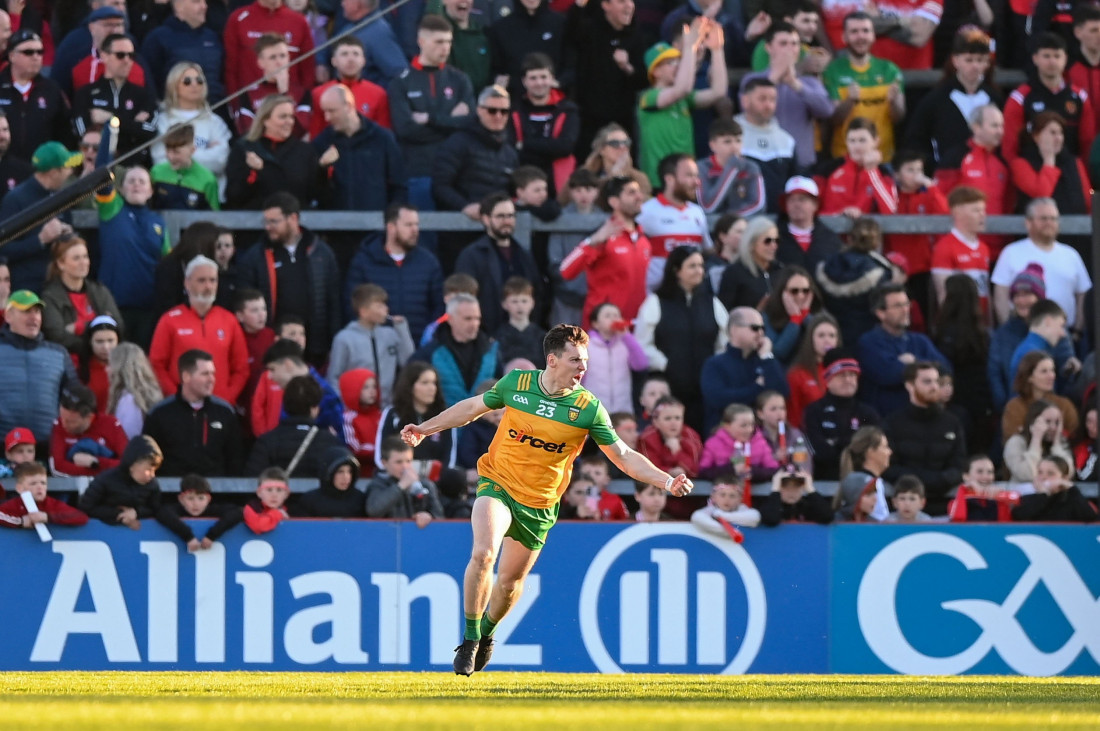WHAT a difference four weeks makes. My last column was published the Sunday before the National League finals where Derry had blazed a trail through Dublin and were roundly commended from all quarters for going at Dessie Farrell’s side.
In the game beforehand, Donegal and Armagh had played out what was an exciting game in its own right, but in comparison to the Division One final, the intensity and levels of football played were not that same.
Fast-forward four weeks to the aftermath of the Derry and Donegal game and how the landscape has changed. Firstly, fair play to Donegal. They were full value for their victory and fully deserved it. In Celtic Park last weekend they were the better side. They played with a higher intensity, seemed to have more drive and purpose and were definitely more clinical when it came to taking their chances and putting scores on the board.
If someone had have told me on Saturday morning Derry would have scored 0-17, I would have been delighted and taken that with both hands. But not even Nostradamus himself would have foreseen the four goals Derry would concede. A lot of the talk since has been about the emergence of fly ‘keepers in Gaelic football and their usefulness and the risk versus reward debate.
Hindsight is a wonderful thing so it’s easy for us all to be right in the aftermath but my take on it has always been fairly consistent.
There has to be recognition of a ’keeper coming out to join open play, being the last man, being there for a pass. They usually only do that when their own team is in possession and Derry are very good at this and often use it to their advantage.
However, there is a major difference in a ‘keeper coming out and pressing the opposition kick-outs on the halfway line and contesting them. The ’keeper’s team are not in possession of the ball so unless you can be guaranteed to win the ball from the kick-out, if you press out any distance at all you are immediately under pressure.
The whole idea of this is to make a team taking the kick-out go long or even if it is short, it is still 50/50 and every outfield player has their own man to mark. I would be a big advocate of this tactic but for me the 14 outfielders can do this job adequately. If the 14v14 out the field does not work, then the issue is there, the 14 men not staying switched on.
The second part about it is this: if a ’keeper comes out and his team does not win the ball, teams are so conditioned to making the first pass backwards and it will get recycled along a half-back line and give the keeper time to get back. Well, that is unless you are Donegal.
They had basically said they will play lads like Ciarán Thompson, Jason McGee and Michael Langan in around the middle. Physically imposing players who could disrupt Derry’s midfield and half-back line where most attacks come from. Once they win the ball, the first thing is to look up and get the ball moving forward. They all knew it was coming.
The fourth goal was the epitome of this. Jamie Brennan had made the run and gambled before the ball was won and was in behind the Derry defence anyway. If the ’keeper had have been in nets it was still a 3v2 with outfield players and at that level it usually ends up in a goal. The same with the first goal. It was an overload of Donegal players bearing down on goal anyway so there was a fair chance it would have been a goal anyway.
This was obviously a tactic on Donegal’s part so once the first one goes in, the Donegal players are thinking, ‘he was right, this will work.’ From then on they kept hammering it home. At this point Derry are in catch 22. They are behind and chasing so they feel they need to commit to this more and then that only opens them up further when they don’t win possession.
People have been asking why didn’t they change that tactic after it was being exploited so regularly. Was it stubbornness, a lack of creativity in not knowing how else to play? To me it was probably a bit of panic in chasing the game, feeling they needed to force the issue and they felt they had to go at it in an even more extreme manner.
This only served to play out in a disappointing fashion for the team as a whole. That in essence is what it was, the team as a whole. It was a team tactic and not as if Odhrán Lynch took this upon himself to go and do what he did. It’s something that Derry have worked on as a team so its certainly not the failings of one man.
It will be interesting to see how this affects Derry. Some of the commentary since has been that it will do Derry no harm in the hunt for Sam Maguire, that it will allow the team to avoid the claustrophobic nature of Ulster and give lads a rest. This is true but it is maybe the manner of the defeat that is the issue.
Derry certainly didn’t become a bad team overnight and there is probably a happy medium in there somewhere so roll on the Sam Maguire group stages. We won’t be a top seed this time but sure if you have to win it you have to beat the best teams anyway. We will get at least one or two really tough teams in the group but sure that’s how the dice rolls.
Receive quality journalism wherever you are, on any device. Keep up to date from the comfort of your own home with a digital subscription.
Any time | Any place | Anywhere














